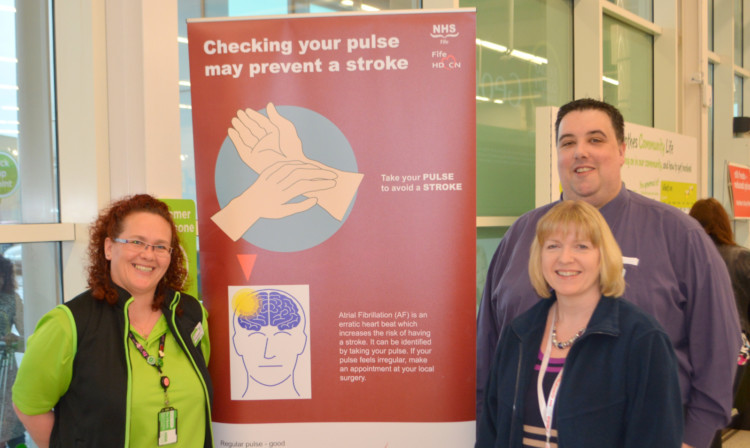A campaign to help Fifers cut their risk of strokes may have already saved lives.
An NHS Fife campaign is encouraging people to take a few seconds to check their pulse for changes in rhythm, which could help identify early symptoms of potential strokes.
And already a specialist nurse has picked up three cases where those being tested had no warning signs they were at risk. They have now been referred to their GP.
One of the more common causes of stroke is atrial fibrillation a change in heart rhythm causing it to become irregular which is attributed to around 14% of strokes.
However, advice from the NHS said that by checking your pulse on a regular basis you could reduce your risk of a stroke.
The campaign explains a good way to think of how a regular pulse should feel is like an athlete jumping over hurdles at regular intervals steady and consistent.
An irregular pulse may feel like the athlete is jumping over several hurdles in quick succession followed by longer spaces between jumps.
As part of the campaign a specialist screening nurse is spending time in surgeries and pharmacies.
The nurse will also visit popular social hubs, including supermarkets, bowling clubs and bingo halls, to encourage the public to check their pulse, and show them how it is done.
Atrial fibrillation nurse Arlene Cobban said: “A quick check which takes only a minute and is simple to perform could save you from having a stroke.
“This campaign has already helped me to identify three people with an irregular pulse, who had no symptoms and were unaware of having atrial fibrillation.
“As such, they have been referred to their GP and with appropriate treatment their stroke risk will be reduced.”
Consultant cardiologist Dr Mark Francis said: “By detecting atrial fibrillation early we have a chance to prevent the complications brought on by stroke.
“Our initial experience has been very good and we have already identified patients with atrial fibrillation, who were previously unaware that they had this condition, and helped to minimise their risk of suffering stroke in future.”
For further information visit www.nhsinform.co.uk.
